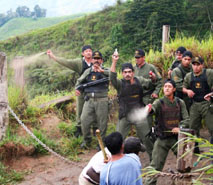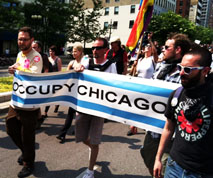
Paraguay Coup: Will Obama Join Latin America and Condemn Ouster of President Fernando Lugo?
Source: Democracy Now!
Paraguayan President Fernando Lugo has been ousted in what he has described as a parliamentary coup. On Friday, the Paraguayan Senate voted 39-to-4 to impeach Lugo, saying he had failed in his duty to maintain social order following a recent land dispute which resulted in the deaths of six police officers and 11 peasant farmers. A former priest, Lugo was once called the “Bishop of the Poor” and was known for defending peasant rights. Argentina, Brazil, Venezuela, Chile and Uruguay have all condemned Lugo’s ouster, but the question remains whether the Obama administration will recognize the new government. We’re joined by Greg Grandin, professor of Latin American history at New York University and author of “Empire’s Workshop: Latin America, the United States, and the Rise of the New Imperialism.” His most recent book, “Fordlandia,” was a finalist for the Pulitzer Prize in history.


